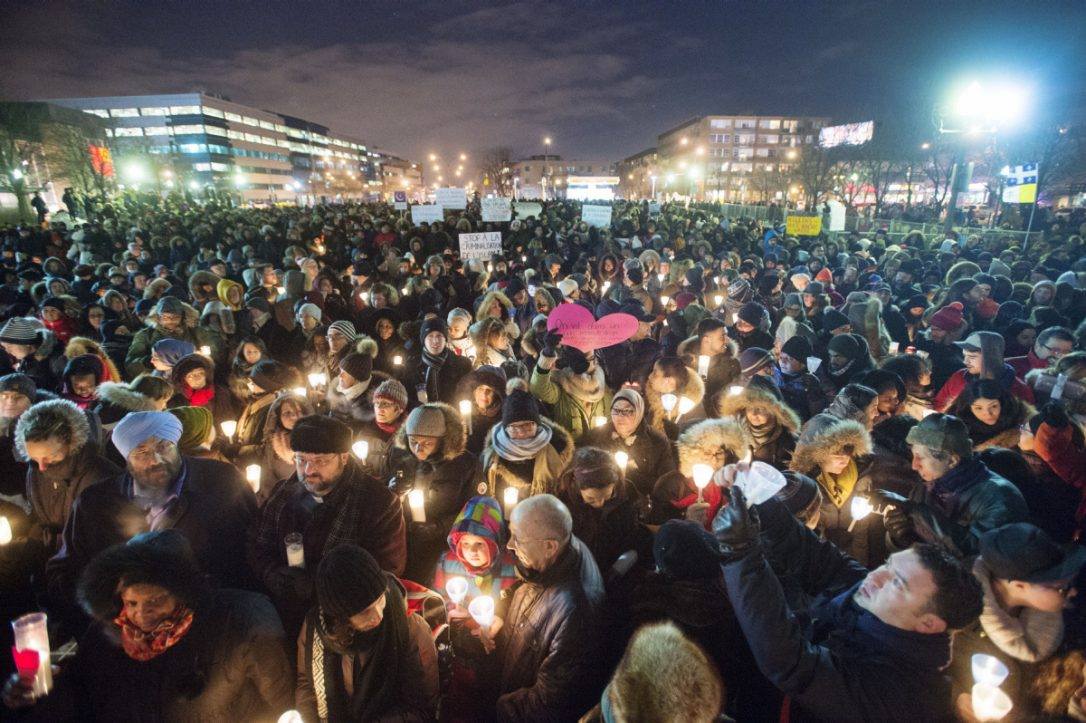
QUEBEC—The whole point of praying is to clear your thoughts and stand in front of God, said Musabbir Alam on Friday at a Quebec City mosque.
That’s not easy after last weekend’s shooting rampage that killed six people, he admitted.
“When you say Allahu Akbar, which means God is great, you’re inside prayer and technically you’re supposed to leave everything behind—technically,” he said.
Alam and other Muslims gathered Friday afternoon for prayers at a small mosque in the basement of a two-floor cottage in Quebec City’s Sainte-Foy district.
About 30 men stood in two rows, side by side, their toes touching, and tried to clear their minds from a week that saw the deadly shooting rampage at a mosque but also an outpouring of support from the community.
A 27-year-old Quebec university student, Alexandre Bissonnette, allegedly opened fire during evening prayers at a mosque Sunday night, a few blocks away from where Alam and others prayed on Friday. He is due to appear in court Feb. 21 to face six charges of first degree murder and five counts of attempted murder that have yet to be tested in court.
Last Sunday’s shooting triggered heightened anxiety at religious institutions across the country.
“It’s clear that the shooting was a crucial point,” said Mohamed Sadqi. “Change will come. But I don’t know what direction it will go. Will it be towards unity and fraternity or more exclusion?”
The thousands of people across Canada who gathered at vigils and at the funerals in Quebec City and Montreal were “encouraging,” said the 26-year-old.
Also welcome was the interfaith effort of a group of Toronto-based Jewish organizations led earlier in the day to express support for the country’s Muslim community.
A local rabbi galvanized synagogues and organized groups throughout the city to form “rings of peace” around mosques during Islamic mid-day prayer services.
Yael Splansky, senior rabbi at Toronto’s Holy Blossom Temple, said she hopes the rings may help dispel some of that fear.
“No Canadian should be afraid to go to their house of worship to pray,” Splansky said in an interview. “It’s a terrifying scene. Imagine people of faith going to pray in peace, to pray for peace, and to be at risk. Houses of worship are sacred and must be protected.”
Splansky said the Toronto peace rings were inspired by past events in Europe.
Attacks against Jewish religious institutions in France and Norway prompted Muslims to form a protective ring around an Oslo synagogue in 2015 and stand guard while Jews offered sabbath prayers.
She said she reached out to other rabbis who had existing relationships with city mosques to gauge interest in showing them support. She said the response was overwhelming, with synagogues not only drawing on existing partnerships but reaching out to form new ones.
Another similar effort was planned at a mosque in St. John’s, N.L., where participants planned to form a “human shield” as Muslims offer up prayers.
The event has won an endorsement from Newfoundland and Labrador’s Human Rights Commission, which said it planned to take part in the event.
“Let us act to challenge the root causes of hatred, including ignorance and prejudice,” the commission said in a statement. “This is a time to get to know our Muslim family and community members, friends, colleagues and neighbours.”
Splansky said she hopes such sentiments will last beyond Friday’s peace rings and prove to be a jumping-off point for more long-term co-operation between faiths.
She said she’d love to see imams and rabbis exchanging religious texts, organizing joint poverty reduction initiatives, forming women’s groups or even just creating book clubs or other social groups.
“I’m hoping that today is not only about today, but about ongoing relationships,” she said.
At the Quebec City mosque, Abde Samad, 23, said he hoped Sunday’s shooting can be a start to uniting communities.
“The reason people hate is ignorance,”he said. “When you think someone is bad it’s because you haven’t met them.”